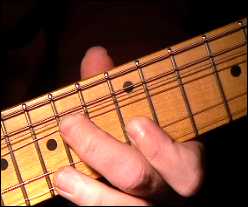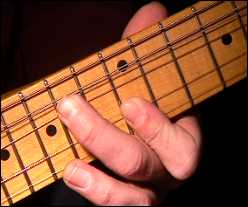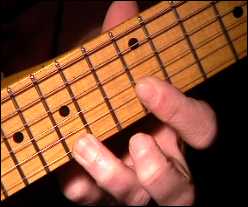Scroll through the lesson and click on notation/video/audio links to load the interactive players.
Please subscribe to get full access to all lessons for only $7.95/month PLUS 1 week free trial.

Riff Interactive lessons are
LESS expensive and
MORE interactive than alternatives!
More Info
|
|
| Lesson Subject:
Jimmy Page Blues Rock |
| What you learn:
Early Zeppelin Style |
| Teacher: Michael Johnson |
Michael: This lesson series covers the early Zeppelin era of Jimmy Page, he's one of my
favorites! Jimmy Page was a session player in the early days, playing on tracks
like "It's Not Unusual" by Tom Jones and songs of that period, he
later joined the "Yardbirds" playing bass and then guitar. Page has a heavy
blues influence, listening to players like Albert King, Elmore James, Muddy
Waters, etc etc etc.... so most of his early Zep recordings has a heavy
blues rock sound The lesson sample will give you an idea of the licks
you'll learn:
Lesson Sample
Michael: Yes Ice, we will use the E
minor pentatonic scale for the coming licks:
Michael:
OK, most
the licks will be based in that scale pattern. Here's a jam track in E you can
practice the licks and scale over:
Jam Track 1
Michael:
Load this track and start playing!
ECGilmour: Does Page tend to hit the blue note (b5) or
does he generally stick with the plain minor pentatonic?
Michael:
Yes, EC, but for these licks he uses the
Minor Pentatonic pattern. Here's our first lick:
Lick 1
Michael: This is a
common lick Page uses, notice the bend on the 3rd string using the 2nd
finger.

ECGilmour: Are those 12 15 12s hammer-ons and
pull-offs?
Michael:
Yes, EC, this allows you to bend the
first note then play the 2nd string/12th fret, then jump to a pull-off,
this helps to add a flow to the lick.
Jeff: Wouldn't
you want to aid your second finger with your first finger teach in the bend....I
use two fingers to bend to aid support.... on a full bend ....1/4 bend
isn't too bad with one finger.
Michael: Jeff, that would slow the lick up
because the 1st finger needs to be in position to play the notes on the 12th
fret. I suggest building the strength of your 2nd finger for the bends, 1/4 bend
is a b5 note, which is in the blues scale, so it works great. Here's the next
lick:
Lick 2
Michael:
These 2 licks are basically the same
though, only you add the 1st string.
ECGilmour: Only one note is
different.
Michael:
You bet EC. See how the subtle addition
of the note can change the sound that help you position to play the entire
lick smoothly. Notice how I position my
hand in the next picture.

Michael:
The 2nd finger bends, while the 1st
finger barres the 1st and 2nd strings, then the 3rd finger is positioned to play
the pull-off. Here's the next lick:
Lick 3
Snake: 12 pull
off 15??
Michael:
Yes snake, now this lick plays a simple
pull-off on the 1st string.
ECGilmour: Nice, I love those triplet pull-off
thingies
Michael: I like then too, the key is also
positioning your hand, I barre the 1st and 2nd string 12th
fret.

Michael: OK, next lick:
Lick 4
Michael:
Notice this run uses the E Minor Pentatonic pattern I gave you earlier.
Finn: I
play as fast either way
Michael: Finn, you can do that, but you might not
have as much control, the rest of you should take you time. The Riff
application lets you select a section and slow the file in pitch you can slow
it as much as you want.
Beestin: For those triple legato's, what is the proper
picking pattern?
Michael: Beestin, you can use all down strokes, this gives you more
attack. Jimmy studied the blues players who focused on controlling the pitch
when bending, you can use your 3rd finger, but it might slow you a bit and have
less control.
ice:
That
is fast i can get my fingers to go that fast i never work on speed like that,
the only time i use any speed is when i play jazz
Michael:
Playing Jazz, classical and progressive
rock is a different technique for fingering. I'm not saying its wrong to
use on these licks, its more of the way Page would play
it.
Beestin: That
is cutting my speed in half (as apposed to alt picking) should i practice this
way from now on/
Michael: Beestin,
the pull-off helps with increasing speed. Here's our next lick:
Lick 5
Lick 5 - picking
Brendan: Are there any good exercises to build up
speed? because mine is horrendous.
Michael:
Yes there are Brendan. The picking
pattern for this lick is also a good pattern to practice. As far as the key for
the next lick, it basically starts with the E
note/chord, the entire progression is based on that note/chord... thus we call
it in the key of E, etc. Here's our next lick, this next lick is
basically double picking (alternate) the ascending E minor pentatonic scale
pattern.
Lick 6
Jeff:
Pagey uses a lot of hybird picking too doesn't he
teach...?Ok... I had read once that he did use hybird a lot...Like in Stairway to
heaven...
Michael: Jeff, Page has an unusual picking style,
at times sound sloppy, but with a interesting attack unique to blues players.
Michael:
Now the last lick jumps into the other E minor pentatonic box
positions. Notice how each of these licks segments start
with a bend, then jumping to a lower note. Now let's try something outside
of the scale pattern I sent earlier. This next lick uses a common pull-off on
the open position.
Lick 7
Michael: I have a
few more jam tracks, sure here you
go....
Jam Track
2
Jam Track 2b
Michael:
Time for me to go class.
|
<< load notation from left
|
|
<< load audio from left
|
<< load audio from left
|